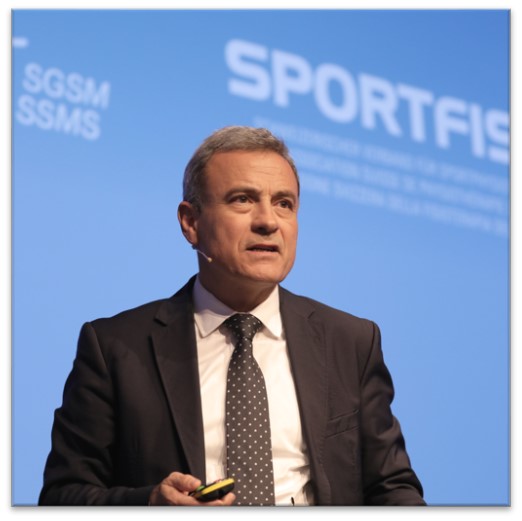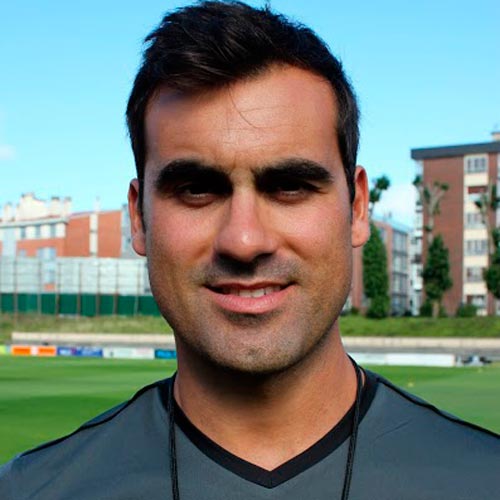Professional Diploma in Team Sports Injuries
€ 990
507,757 Alumnos matriculados
€ 990
03/01/2026
Nivel: Advanced
Delivery mode: Online-based
Duration: 9 months
Average dedication: 6/8 weekly hours
Impartido en: English
EXPERT ADVISORS

Gil Rodas Font
Medical Doctor and Surgeon. Specialist in Physical Education and Sports Medicine. Head of the Barça Innovation Hub Medical Service area.

Paco Seirul·lo Vargas
Head of FC Barcelona's Methodology area.

Daniel Romero Rodriguez
Physiotherapist. Physical trainer and rehabilitator of competitive high performance athletes. Performance, prevention and post-injury rehabilitation advisor for various professional football players.

Francesc Cos
Former Head of Strength Training for FC Barcelona's first team football squad (2004-2016). Former Director of the Performance area of Barça Innovation Hub (2016-2018). Currently Physical Trainer of the Manchester City.

David Casamichana Gómez
Doctor in Physical Activity and Sports Science. Physical trainer in soccer. University Professor and Researcher.

Ana Merayo García
Sports Psychologist. Instructor. Coordinator of the SAIE (Service for Comprehensive Athlete Care) at Masia 360, FC Barcelona.
- CURSOS QUE LO COMPONEN |
- CURSOS QUE LO COMPONEN |
- CURSOS QUE LO COMPONEN |
- CURSOS QUE LO COMPONEN |
- CURSOS QUE LO COMPONEN |
- CURSOS QUE LO COMPONEN |
- CURSOS QUE LO COMPONEN |
- CURSOS QUE LO COMPONEN |
- CURSOS QUE LO COMPONEN |
- CURSOS QUE LO COMPONEN |
MODULE 1: Prevention of and readaptation from injuries
MODULE 2: Muscle injury and tendinitis management
MODULE 3: Management of joint and bone injury
MODULE 4: Decision making and returning to competition
MODULE 1: BASIC CONCEPTS IN EPIDEMIOLOGY AND INJURY PREVENTION
Unit 1: Basic Concepts in Injury Prevention
Unit 2: Epidemiology in Team Sports
MODULE 2: MUSCLE INJURY PREVENTION
Unit 1: Prevention of the Most Frequent Muscle Injuries
Unit 2: The Preventive Approach to Muscle Injury Prevention
MODULE 3: PREVENTION OF JOINT INJURIES
Unit 1: Prevention of the Most Frequent Lower Limb Joint Injuries ACL (Anterior Cruciate Ligament) Injury
Unit 2: Prevention of the Most Frequent Upper Limb Joint Injuries (Shoulder Injuries)
Module 4: INTEGRATIVE READING
MODULE 1: Management of medical pathology 1
MODULE 2: Management of medical pathology 2
MODULE 3: Sports Specific pathologies
MODULE 4: Special sports and competitions
MODULE 1: Characteristics of the musculoskeletal system.
Unit 1: Movement from the central nervous system.
Unit 2: Function of the skeletal muscles.
MODULE 2: Muscle action and its relationship to sports.
Unit 1: Types of muscle action.
Unit 2: Interrelationship of muscle action in movement and posture maintenance.
MODULE 3: Systemic changes in detraining and immobilisation.
Unit 1: Detraining in relation to the skeletal muscle.
Unit 2: Muscle hypertrophy.
MODULE 4: Assessment of muscular properties in relation to sport.
Unit 1: Surface electromyography.
Unit 2: Tensiomyography.
MODULE 1: Characteristics of the musculoskeletal system.
Unit 1: Movement from the central nervous system.
Unit 2: Function of the skeletal muscles.
MODULE 2: Muscle action and its relationship to sports.
Unit 1: Types of muscle action.
Unit 2: Interrelationship of muscle action in movement and posture maintenance.
MODULE 3: Systemic changes in detraining and immobilisation.
Unit 1: Detraining in relation to the skeletal muscle.
Unit 2: Muscle hypertrophy.
MODULE 4: Assessment of muscular properties in relation to sport.
Unit 1: Surface electromyography.
Unit 2: Tensiomyography.
MODULE 1: Analysis of injury in sports: injury mechanisms and associated risk factors.
MODULE 2: Sports injuries and their relationship with the quality of strength.
MODULE 3: Strength manifestations and muscle power in the post-injury rehabilitation process.
MODULE 4: New paradigms in strength training: muscle building through vascular occlusion.
MODULE 1: Relationship between internal load variables, and between external load variables
MODULE 2: Relationship between external load variables
MODULE 3: Integrating measurements. Efficiency index
MODULE 4: Selecting variables
MODULE 1: MOTOR CORTEX AND CORTICAL SPINAL TRACT
Unit 1: Motor Areas
Unit 2: Giant Pyramidal Cells of Betz and the cortical spinal tract
MODULE 2: ROLE OF THE CEREBELLUM AND BASAL GANGLIA
Unit 1: Cerebellum
Unit 2: Basal Ganglia
MODULE 3: FEEDBACK AND MOTOR ADJUSTMENT
Unit 1: Neurocybernetics
Unit 2: Feedback
MODULE 4: INTEGRATIVE MODULE
MODULE 1: Systemic model
MODULE 2: Sports career model I and II
MODULE 3: Dual career
MODULE 4: Examples of intervention in different transition stages of an athlete's life
Aprende a
- Get to know the fundamental characteristics for both prevention strategies and injury rehabilitation, as well as the different injury mechanisms in team sports.
- Propose efficient prevention strategies based on a process founded on scientific evidence.
- Handle pathologies and specific injuries corresponding to each sport.
- Improve critical analysis by completing a training program on the different professional roles of sports science and health.
- Determine how the central nervous system influences human movement as well as how we can shape the ability to make decisions for movement.
- Apply the appropriate methodology to the design of the post-injury rehabilitation process in situations where strength development plays a significant role.
- Analyze workload monitoring data to orientate the training process towards preventing injuries and consequently successfully optimize sports performance.
- Identify the areas involved in the control and adjustment of movements, as well as how they are involved.
- Manage specific strategies to support a dual career and understand the different transitions in an athlete's life.
Certify your skills
Gracias a la integración con tecnologías de supervisión remota, el Certificado de Aprobación Verificado de Barça Innovation Hub - Universitas:

- Garantiza la transparencia del proceso de certificación
- Valida la identidad del titular del certificado
- Acredita la adquisición de competencias y habilidades específicas
What does it include?
 24-HOUR ACCESS TO STUDY MATERIAL, FROM ANYWHERE, ON ANY DEVICE
24-HOUR ACCESS TO STUDY MATERIAL, FROM ANYWHERE, ON ANY DEVICE
 Acompañamiento, seguimiento y soportevirtual de un experto en la materia
Acompañamiento, seguimiento y soportevirtual de un experto en la materia
 ACTIVITIES AND ASSESSMENTS WITH PERSONALIZED FEEDBACK
ACTIVITIES AND ASSESSMENTS WITH PERSONALIZED FEEDBACK
 DISCUSSION FORUMS AND INTERACTION WITH COLLEAGUES FROM ALL OVER THE WORLD
DISCUSSION FORUMS AND INTERACTION WITH COLLEAGUES FROM ALL OVER THE WORLD
 Certificado emitido por Barça Innovation Hub y avalado por la institución correspondiente
Certificado emitido por Barça Innovation Hub y avalado por la institución correspondiente
 Self-assessment to measure your learning progress
Self-assessment to measure your learning progress

















































